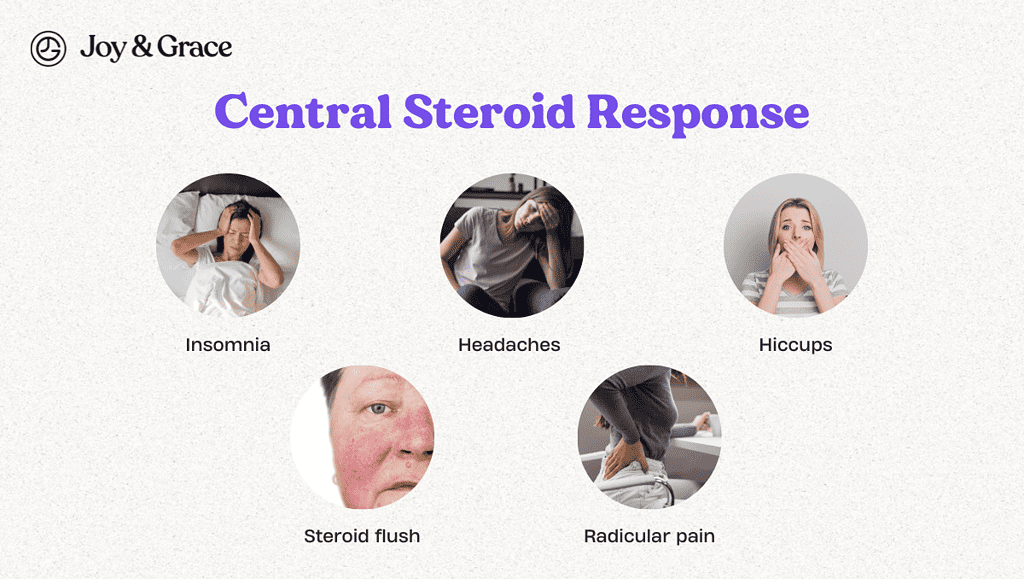Cortisone shots are a popular treatment for neck pain, as they are an effective way to provide relief from pain and inflammation. However, it is important to be aware of the potential side effects of cortisone shots before deciding to use this treatment.
We’ve gathered numerous articles and journals on the side effects of cortisone shots for neck pain. We’ll also talk about some tips for minimizing the risk of experiencing these side effects.
Can A Cervical Epidural Steroid Injection Cause Long-Term Side Effects?
While considered rare, cervical epidural steroid injections can cause some long-term side effects. This is especially true if a nerve is damaged due to the procedure.
When done improperly, the needle may be inserted too deep, damaging a nerve and surrounding tissue.
Aside from possible nerve damage, steroid shots also carry a risk for systemic side effects.
Are Steroid Shots In The Neck Safe?
Although they are generally considered low-risk, cortisone injections into the neck still carry a risk of side effects. Some physicians also discourage the use of steroid injections for neck pain.
According to a study by Dr. Nancy Epstein, a professor of clinical neurosurgery at the School of Medicine at the State University of New York,
“Too many patients, with or without significant cervical disease, unnecessarily undergo cervical epidural steroid injections. These include interlaminar (ICESI) and transforaminal ESI (TF-CESI) injections that are not Food and Drug Administration (FDA) approved, have no documented long-term efficacy, and carry severe risks and complications.”
What Are The Side Effects Of A Steroid Shot In The Neck?

Corticosteroids are a type of drug that mimics a hormone naturally produced by our bodies called cortisol. Cortisol plays a major role in several bodily processes, including stress, metabolism, and immunity. Because of this, corticosteroids can cause various side effects when taken in excessive amounts.
Receptors for steroid hormones are also present in the brain and can result in symptoms called “central steroid response.” This includes:
- Insomnia
- Headaches
- Hiccups
- Steroid Flush. You may have redness in the face and chest and feel uncomfortably warm for several days.
- Pain that radiates from your back to your legs (This is called radicular pain). This is considered one of the most common adverse effects of steroid injections. Radicular pain can happen immediately or later after the injection.
Aside from its effects on the nervous system, excess corticosteroids can also cause disturbances all over the body and these include:
- Increased sugar levels
- Decreased bone density. This means that your bones become more fragile and prone to fractures.
- Decreased energy levels
- Acne
- Low blood pressure
- Weakened muscles
- Increased appetite and weight gain
- Thinning of the skin at the injection site
- Suppression of the hypothalamic-pituitary-adrenal (HPA) axis.
- The HPA axis comprises the hypothalamus, pituitary, and adrenal glands. These glands release hormones that help regulate stress and other body functions.
When this system is suppressed, it can lead to:- Digestive problems
- Decreased immunity
- Sexual problem
- Menstrual changes
- Water Retention
- Mood changes such as depression and anxiety
- The HPA axis comprises the hypothalamus, pituitary, and adrenal glands. These glands release hormones that help regulate stress and other body functions.
Can I Get Nerve Damage From A Steroid Injection?
As we mentioned earlier, steroid injections can indeed cause nerve damage. Aside from causing trauma to the nerve, the drugs used can actually have damaging effects on your nerves. Nerve injury can happen when the needle is inserted too deeply or if the steroid is injected in the wrong area.
What Happens If A Cortisone Injection Hits A Nerve?
Nerve damage from a cortisone injection can result in an abnormal function of a specific body part due to nerve injury. This is called a neurological deficit. Neurological deficits can present as loss of control of a limb or muscle, abnormal sensations, numbness, and even an inability to speak. This abnormality may become permanent.
Nerve damage can also result in chronic and severe pain due to nerve irritation and inflammation. As you can see, when a cortisone injection goes awry, it can cause the pain it was supposed to treat.
What Are The Risks And Possible Complications Of Cervical Epidural Steroid Injections?
Complications happen when the steroid is improperly injected into the spinal cord, blood vessels, and nerves. They can also happen when contamination occurs. The incidence of cervical epidural injection complications is estimated to be 16.8%. These complications include:
- Spinal Epidural hematoma. This is when blood collects between your spine and its protective membrane, the dura.
- Infection. This happens when the target site and equipment are not adequately sterilized. Infection is a serious complication of this procedure and can lead to an abscess or meningitis.
- Intravascular injections. This is when the medication is injected into a vein. This is also a severe complication since it can cause bleeding and clot formation, possibly resulting in a stroke. - H3
These complications can result in paralysis and visual or speech problems.
Aside from the complications above, you may also be allergic to the steroid drug. If you do have an allergic reaction to the medication, you may experience a wide range of symptoms. It may range from a simple rash to difficulty breathing and low blood pressure.
Is Depo-Medrol The Same As Cortisone?
Yes, Depo-Medrol is the brand name of a type of corticosteroid called methylprednisolone. Like other corticosteroids, methylprednisolone also helps relieve pain and inflammation.
What Are The Side Effects Of A Depo-Medrol Injection?
Depo-Medrol is generally safe and effective, but similar to other steroids, it can cause a variety of side effects. These include:
- Nausea
- Vomiting
- Stomach pain
- Acne
- Headaches
- Dizziness
- Insomnia
- Weight gain
- Fatigue
Like other steroids, methylprednisolone may also lead to serious side effects such as mood changes and infection.
How Long Do Depo-Medrol Side Effects Last?
Most side effects of Depo-Medrol are short-lived and will usually resolve within a few days after the injection. However, long-term side effects such as the risk of infection, mood changes, and osteoporosis can persist for weeks or even months.
What Should I Expect After My Cervical Epidural Steroid Injection?

If a local anesthetic came with your steroid injection, you might feel heaviness or numbness in your neck, shoulder, and arms right after the shot. The benefit of having a local anesthetic is you may have instant relief from your pain, but it may come back within a few hours. This is because the steroid has yet to set in.
Your neck may still be sore for a few days before the steroid takes effect. Steroids usually take 1 to 5 days to kick in, and the pain relief can last for several days to months.
For a few days, you should do less than usual. But you may be able to return to your everyday life immediately. If your pain improves, you can keep doing your usual activities or undergo physical therapy.
But even if your pain is much better, try not to do too much. If your pain doesn’t improve much or comes back, your doctor may want to give you another injection in a few weeks. Talk to your doctor about other ways to treat your pain if it hasn't gone away.
Is A Cervical Epidural Steroid Injection Painful?

A local anesthetic is usually injected along with the steroid to numb the target area and will usually cause a very tiny and temporary pinch. Because of the anesthetic, it’s possible that you won’t feel anything at all, or you may experience the following:
- A light pressure
- A tingling or burning sensation
- A short period of mild pain
These sensations usually disappear right after the injection.
How Will I Feel After Neck Steroid Injections?
As we mentioned earlier, your neck, arms, and shoulder may become numb after the injection. If your procedure did not involve the use of anesthetics, you may feel soreness at the site of the injection. This is perfectly fine and may last for only a few hours.
Some people may feel nauseous or dizzy right after getting the shot. This is nothing to worry about, as these symptoms typically don’t last long.
Can I Drive After Steroid Injection In The Neck?

Since it commonly involves the use of local anesthetics, it is generally not recommended for you to drive right after the procedure. As mentioned earlier, there may be numbness in the arms and shoulder. This can impair your driving and make you prone to dangerous road accidents.
What Can I Do To Minimize Side Effects From Cortisone Injections?
To minimize the side effects of cortisone injections, here are a few tips:
1. Ask your doctor about other treatment options. Cortisone injections should only be used as a last resort.
2. Make sure to follow your doctor’s instructions for the injection. This includes the amount of medication, the frequency of injections, and the injection site.
3. Limit the number of injections you receive. Cortisone can cause long-term damage if used too frequently.
4. Take a break between injections. Allow at least a week or two between injections to give your body time to recover.
5. Monitor your symptoms. If you experience any side effects, contact your doctor immediately. This is especially true if you develop a fever or swelling in the injection site, as these can be a sign of infection.
6. Eat a healthy diet and exercise regularly. Eating a balanced diet and getting regular exercise can help reduce the effects of steroids on your metabolism.
By following these tips, you can minimize the side effects of cortisone injections and ensure that you get the most out of your treatment.
Takeaway
Cortisone shots are a common treatment for neck pain, but like any other medical procedure, they come with potential side effects. Before deciding to receive a cortisone shot, it is important to be aware of the potential risks and talk to your physician about any concerns.
Possible side effects include infection, skin thinning, and nerve damage. It is essential to weigh the risks and benefits of this treatment option carefully.
Before proceeding with the procedure, it is important to talk to your doctor about the potential risks and complications. Your doctor will be able to evaluate your condition and determine if the procedure is right for you.















